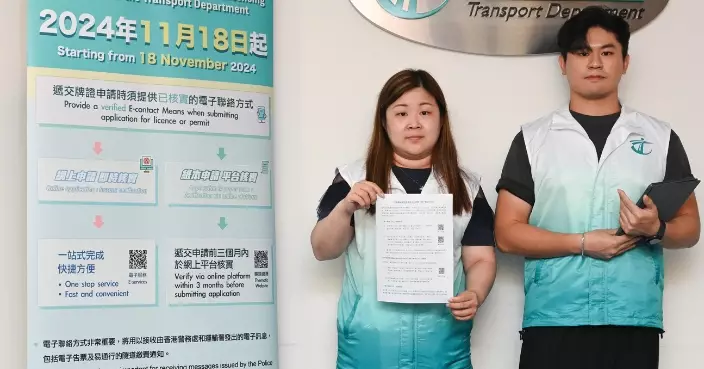Speech by DCS at Opening Ceremony of 42nd Asian and Pacific Conference of Correctional Administrators (With photo)
Following is the speech by the Deputy Chief Secretary for Administration, Mr Cheuk Wing-hing, at theOpening Ceremony of the 42nd Asian and Pacific Conference of Correctional Administrators (APCCA) today (November 18):
Deputy Director General Cheng Wei (Deputy Director General of the Bureau of Prison Administration, the Ministry of Justice of the People's Republic of China),Secretary Tang Ping-keung (Secretary for Security),Commissioner Wong Kwok-hing (Commissioner of Correctional Services),Emeritus Professor Neil Morgan (APCCA Rapporteur),Mrs Irene Morgan (APCCA Rapporteur), distinguished guests, ladies and gentlemen,
Good morning. It is my great honour to, on behalf of the Hong Kong Special Administrative Region Government, welcome you all to the 42nd Asian and Pacific Conference of Correctional Administrators (APCCA). It is exceedingly good to see more than 140 professionals of prison and correctional administrations joining this year's five-day conference. We warmly welcome delegations from 29 jurisdictions in the Asia-Pacific region, including 16 Belt and Road countries, to come to our city. Hong Kong is privileged and proud to be the host of APCCA for the fourth time. The presence of so many heads and deputy heads of correctional institutions at this conference speaks volumes for the status and importance of APCCA.
The theme of this year's conference is "Collaboration for Sustainable and High-quality Development", which highlights our keen determination to advance and deepen multilateral co-operation among the correctional authorities in the Asia-Pacific region to achieve sustainable and high-quality development in the realm of corrections.
The Hong Kong Correctional Services Department (HKCSD) is a linchpin of Hong Kong's social stability. With the Department's strenuous efforts in ensuring a safe and secure custodial environment, providing diversified rehabilitation programmes and extending its reach beyond the prison walls through promoting crime prevention education in the community, Hong Kong's recidivism rate has recorded a significant decrease from 39.9 per cent in 2000 to 21.7 per cent in 2021, making Hong Kong one of the safest cities in the world. This outstanding achievement did not come easily.
Over the years, the HKCSD has put a strong focus on applying innovation and technology to raise its management efficiency, the level of security of correctional institutions and the effectiveness of rehabilitation programmes. The HKCSD launched the Smart Prison protocol in 2018. Since then, technology projects covering different areas of prison administration have been introduced in its institutions. For four consecutive years from 2021 to 2024, the HKCSD was awarded silver medals for its innovative projects by the International Exhibition of Inventions of Geneva, the largest global exhibition devoted exclusively to inventions.
The HKCSD has also been making use of technology to provide e-services for the convenience of the public. For example, a Social Visit e-Booking Service was launched last year for members of the public to schedule visits to persons in custody online. This e-booking service project and another smart prison project, the Integrated Custodial and Rehabilitation Management System, won the Hong Kong Smart City Initiative of the Year at the GovMedia Awards 2024, which gives recognition to outstanding government initiatives in the Asia-Pacific region to honour organisations that exemplify leadership, creativity and impactful results in public services. The HKCSD would be sharing its experience in launching these initiatives later during the conference.
Apart from its core duties, the HKCSD also endeavours to strengthen professional exchanges and collaboration with counterparts at regional and international levels. For example, the HKCSD has participated in international conferences and functions such as APCCA and the International Corrections and Prisons Association (ICPA) Conference. In September this year, HKCSD's Project JET rehabilitation project was awarded the 2024 Community Corrections Award, an award presented by the ICPA for remarkable results achieved in the corrections profession. These achievements are not only conducive to closer cooperation with our counterparts and a wider network of correctional systems, but also help Hong Kong's integration into the overall national development and telling our story worldwide.
Following this APCCA conference, the HKCSD will next host the first Greater Bay Area Correctional Tactical Skills Competition early next year, which aims to foster an exchange of experiences in crisis management and reinforce the rapport between the HKCSD and other correctional authorities in the Greater Bay Area. If you do not already know, ladies and gentlemen, the Greater Bay Area comprises 11 cities in the Guangdong, Hong Kong and Macao area with a combined population of 86 million. The competition will be another precious opportunity for strengthening regional collaboration on handling correctional emergencies.
Ladies and gentlemen, I have no doubt that you have a packed programme in the next few days. But if at all possible, please find time to go around the city which has quite a lot to offer in terms of food and beverage, local characteristic, transport efficiency, arts and culture and so on. I assure you that you would find the time spent worthwhile.
Lastly, I want to thank the HKCSD for organising this important regional gathering. I wish the conference great success, and all of you a good and fulfilling time in the week ahead. Thank you very much.

Speech by DCS at Opening Ceremony of 42nd Asian and Pacific Conference of Correctional Administrators (With photo) Source: HKSAR Government Press Releases
Public urged to support World Antimicrobial Resistance Awareness Week
The Department of Health (DH) today (November 18) urged members of the public to use antibiotics appropriately in support of World Antimicrobial Resistance (AMR) Awareness Week, running from today to November 24 annually. The theme of the World Health Organization (WHO) this year is "Educate. Advocate. Act now."
AMR remains a top global threat to public health. According to a recent overseas study, it was estimated that about 4.71 million deaths were associated with bacterial AMR globally in 2021, including 1.14 million deaths attributable to bacterial AMR. Forecasts show that an estimated 1.91 million deaths attributable to AMR and 8.22 million deaths associated with AMR could occur globally in 2050. The WHO is urging a concerted global effort through cross-sector collaboration via the One Health approach to tackle this AMR threat.
In 2016 the Government set up a High Level Steering Committee on AMR (HLSC) and formulated the first Hong Kong Strategy and Action Plan on Antimicrobial Resistance (Action Plan) in 2017. Since the launch of the Action Plan, a series of actions against AMR have been implemented in accordance with the strategies laid out in the plan by different action parties, with good progress being made. In 2022, the Government launched the second Action Plan to map out response strategies for the next phase, covering the years from 2023 to 2027.
Educate
The Centre for Health Protection of the DH has long educated healthcare professionals and the public on the proper use of antibiotics, and has regularly monitored the knowledge, attitude and practice of the public on antibiotic resistance. Increasing knowledge of AMR among the general public has been noted according to the latest results of a survey in 2023. For instance, respondents correctly answering that cold and influenza should not be treated by antibiotics increased from 37 per cent in a 2016/17 survey to 84 per cent in the 2023 survey. Moreover, respondents who completed the entire course of antibiotic treatment as instructed by doctors increased from 88 per cent to 92 per cent in the same period. Yet, less than 40 per cent of respondents were aware that bacteria resistant to antibiotics can be spread from person to person.
The Food and Environmental Hygiene Department (FEHD) has long been educating the public to observe good personal and environmental hygiene throughout food preparation and handling to reduce the risk of AMR. In addition to organising talks and producing guidelines and pamphlets, the Centre for Food Safety of the FEHD has also incorporated relevant content into the training courses under the Hygiene Manager and Hygiene Supervisor Scheme.
Advocate
The Government has established a surveillance system to track the trends of antimicrobial use and antimicrobial resistance in the human, animal and food sectors according to the Action Plan. Further research will be conducted to better understand the situation of AMR in the local environment.
Antimicrobial Stewardship Programmes are in place in public and private hospitals to optimise the use of antibiotics by providing evidence-based antibiotic prescription guidelines for common infections as a reference. The guidelines will continue to be updated based on local epidemiology and international best practices.
Furthermore, to address the threat of emerging multidrug resistant organisms (MDROs) in residential care homes for the elderly (RCHEs), the Government has enhanced support to RCHEs to strictly implement infection control measures and reduce the risk of transmission of MDROs in the RCHEs.
Regarding the livestock sector, the Agriculture, Fisheries and Conservation Department (AFCD) has implemented the "veterinary prescription-only medication supply" policy in phases at the local livestock farm level to tighten the regulation on the use of antimicrobials in animal husbandry, in particular those critically important antimicrobials for humans.
Act now
The Government has long attached great importance to tackling the issue of AMR, and has acted promptly according to the latest international and local developments. Relevant bureaux/departments and organisations, including the Health Bureau, the DH, the FEHD, the AFCD and the Hospital Authority will continue to combat the challenge of AMR through cross-sector co-ordination and collaboration with private hospitals, professional bodies, academia and other stakeholders.
In light of the latest findings, a spokesman for the CHP urged members of the public to join the fight against antibiotic resistance by observing the following advice:
Take adequate rest and drink plenty of water when having a cold or flu. If symptoms persist, consult a doctor and do not buy antibiotics without a prescription at community pharmacies;
Do not demand antibioticsfrom doctorswhen not indicated. Only take antibiotics when advised by doctors and complete the whole course of treatment even if symptoms have improved;
Follow precautions stated on the prescription bag and adopt appropriate infection control measures such as practising frequent hand hygiene, wearing a surgical mask when having respiratory symptoms, and disinfecting and covering all wounds properly to prevent person-to-person spread of resistant bacteria when taking antibiotics;
Receive seasonal influenza and COVID-19 vaccines as effective means to prevent secondary bacterial infection, hence reducing the use of antibiotics and occurrence of AMR;
Be aware of the risk of acquiring resistant bacteria from ready-to-eat (RTE) food. People taking antibiotics or antacids, and susceptible populations (such as pregnant women, infants and young children, the elderly and people with weakened immunity) are of higher risk and should therefore avoid eating raw and undercooked RTE foods; and
Observe good hygienic practices in the kitchen when handling food to minimise the risk of cross-contamination by resistant bacteria.
The CHP will continue to work with doctors to enhance education on the appropriate use of antibiotics and to remind patients about risk of antimicrobial resistance. For details of information about antimicrobial resistance, please visit the CHP thematic website and the CHP Facebook Page.







